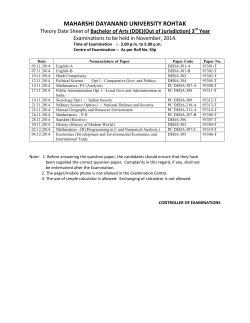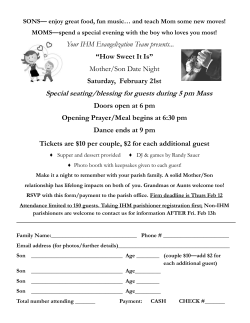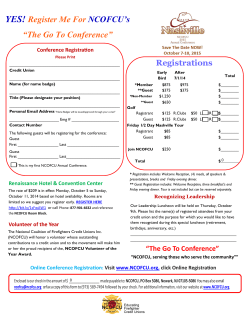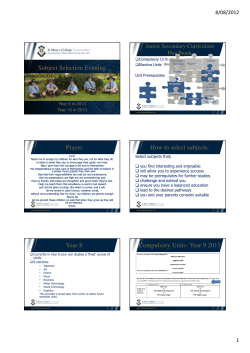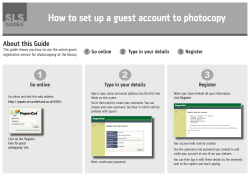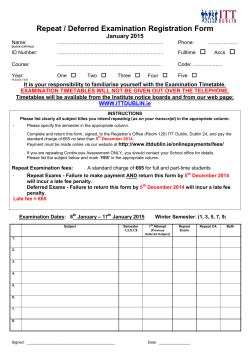
PAD - Askew School of Public Administration and Policy
PAD 5417-01 Human Resource Management Summer, 2014 James S. Bowman jbowman@fsu.edu 644-7605 662 Bellamy (contact for afternoon appointments) Description/Objectives Today’s human resource challenge threatens the capacity of organizations to accomplish their missions. The US Government Accountability Office, in fact, has classified management of human resources as a high-risk concern confronting government for over a decade. The last decade has brought enormous change to the field including massive software changes, recruitment innovations, accelerated workforce planning, changes in career expectations, contending compensation strategies, and new forms of performance evaluation among others. The field encompasses such issues as workforce diversity, drug testing, workplace violence, strikes, civil service reform, lie detectors, sexual harassment, employee quality, and comparable worth. As well, perennially controversial traditional management concerns (e.g., career systems, personnel appraisal, merit pay, adverse action) are fundamental to the study of the subject area. The management of human capital, as reflected in such problems, is both a science and an art; there are various approaches to the subject, but no single right way. Those looking for neat answers to complex questions are likely to be disappointed by any source they consult. However, by gaining an understanding of competing principles and strategies, leadership, management, and problem-solving competencies can be developed to address contemporary governance challenges. In short, there are a number of course objectives; upon completion, the student will be able to: be conversant in the assumptions, philosophies, and methods of HRM; think critically about the connections between course material and your own career; recognize paradoxes in the field and strive to resolve them; compare and contrast commonly used techniques with “weird science” approaches; and sketch components of “ideal” systems for, and future trends in, key functional areas. Stated differently, learning competencies include: an understanding of the contexts of human resource management, a comprehension of policy development, implement, and administration, an analysis of methods designed to improve performance, and development of oral and written communication skills. Regularly check Blackboard for Announcements; use of your FSU email account is required. Requirements Reading: Berman et al., Human Resource Management in Public Service 4e 1 Bilmes & Gould, The People Factor Handbook (available at Target Copy) Hays et al. (eds.), Public Human Resource Management (recommended) Partnership for Public Service & Booz Allen Hamilton, Building the Enterprise: A New Civil Service Framework (recommended: www.ourpublicservice.org publications) Classroom Format and Attendance “The world is run by those who show up.” The course consists of a mixture of activities (informal lectures, group discussion, videos, and team projects). Generally, the material will parallel, but not repeat, the readings; bring the text and course Handbook to each session. This class features: opening exercises, outlined presentations and unusual peer-share, think & ink discussion techniques, credit for on-time attendance, electronic gadget-free environment Caribbean cruises, group leadership opportunities, feedback on outlines of papers, videos, current event discussions, cases, and practitioner guests. Consider the class sessions to be the campus equivalent of a monthly senior management executive retreat. In this environment, it is not chic to be late or absent; it is “just not done.” Please understand that your contribution has a bearing on the value of the course, both to yourself and to your colleagues; if you believe that your contribution is not important, then please take another class. This student-centered, intensive format relies on teamwork; if you have other obligations that prevent attendance, do not take this course. Course work cannot be learned in absentia, and on-time, active attendance is expected as stated in the university Bulletin. A plus (+) will be added to the student's team development grade (see below) for those with 0 absences (attendance is defined as initialing the roster before class begins and staying the entire period). In the event of an absence, students have an opportunity to prepare an optional short paper. Based on others’ notes and readings, it should provide an overview and analyze selected aspects of the missed material. It is due 5 days after the cleared absence. Regarding tardiness, students are expected to be courteous to the team doing the class opening by arriving promptly; do not abuse the fact that even the most conscientious person, however rarely, may be late for whatever reason. Class sessions are: Friday 5:30-8:15 May 16 Friday 5:30-8:15 June 27 Friday 5:30-8:15 July 18 Friday 5:30-8-15 June 6 Saturday 8:45-4:00 June 28 Saturday 8:45-4:00 Saturday 8:45-4:00 Sunday 12:45-4:00 June 7 Sunday 12:45-4:00 June 29 June 8 July 19 Sunday 12:45-4:00 July 20 The following opportunities are available for increased participation in the course: early afternoon office visits, appointments, student groups, and/or ad hoc dutch-treat coffee breaks. 2 Grading/Evaluation "Anything worth doing is worth doing well." Excellence is based on the actions of people. Accordingly, excellence in management cannot succeed unless all in the organization practice it at a personal level; a commitment to high standards is a privilege and an obligation. As a manager or future manager, you cannot delegate this responsibility; you must show the way by personal example by: arriving early to class, keeping up with the readings and reviewing notes before/after sessions, responding promptly to messages from teammates, meeting and exceeding assignment requirements, and devoting sufficient effort to the course to ensure success. In short, excellence as practiced by the individual and the team is the foundation upon which class quality is built. Final grades may be similar to those for other courses in the School. However, this should not be interpreted as a guaranteed minimum grade. Neither the mere completion of various requirements nor the time spent on them determines the granting of graduate credit. Simple familiarity with the material is not to be mistaken for either understanding or mastery. Your professional growth will be evaluated in two interrelated areas. 1. Team Development (25 percent of course grade with A and B below approximately weighted 5 percent, 20 percent respectively) A. Exercises (Handbook and selected textbook end-of-chapter assignments). As a manager, you should be heard, not just seen. Primary emphasis is on the quality of participation; it is important that comments build on previous classroom remarks and the readings so that learning is cumulative (Handbook, p. 28 for participation standards). Written and oral assignments will be assigned in advance so as to allow proper preparation (late assignments cannot be accepted). These include class openings (Handbook, p. 29) where the host team starts the class with a short activity generally related to that session. All students should bring a 5x7 name card to each meeting. Peer and team evaluations (Handbook, pp. 24-25) will be completed at the end of the term. B. Guest Case (Handbook, pp. 66ff.). Each team will facilitate a 50-minute class exercise based on an actual situation. It should be keyed to one subject area on the Topic Outline below The analysis will be followed by comments from a manager involved in the case. The assignment is a problem-solving exercise, not a guest lecture; the objective is to compare theory with practice. The sessions will be scheduled, subject to guest availability, as follows: Team One: June 6/7, Teams Two & Three: June 27/28, Team Four: July 18/19. 2. Individual Development (75 percent of grade; A and B are weighted equally). A. Take-Home Examination This final consists of approximately nine questions and will be distributed on the last class day; six days are available to finish it. All answers should be five to eight paragraphs in length; questions will be weighted 40 percent on class work, 60 percent on readings. Each essay must be: 3 coherent (contain an introduction, text, and conclusion), documented (make specific references to course information), and critical (do not merely repeat the material). Examination papers, single-spaced and in 12-point font, must be received via email no later than the above deadline. This testing approach is an effective learning device—provided that all readings are completed prior to the examination (any other strategy is a high-risk, self-defeating approach). It is not, stated differently, feasible or desirable, to attempt to complete the test without proper preparation (i.e., the items are integrative, “thought” questions; they cannot be “looked up and copied down”). C. Project Like examinations, term projects confront the student with what s/he knows and does not know; both expect evidence of comprehension and mastery. This assignment (which does not come with a delete key) is an analysis--not a description--of a significant HRM problem in an organization personally familiar to the student (i.e., you have easy, face-to-face access to organizational personnel, documents, and data). The paper should include a clear linkage to course objectives, an examination of pertinent paradoxes, and implications for civil reform reform. This “hands-on,” theory-practice paper must integrate the academic literature with original interview and documentary data from the agency under study (required interviews can be anonymous). The 14-15 page analysis (plus references and appendices) will emphasize various options to address the problem. Since writing is an act of discovery, a work in progress as well as a product, steps to project completion include: Submitting, via email by June 4, a problem statement (Handbook, p. 80) with: o o o o a working paper title (identify the subject in several words) with this explanatory subtitle—“An Analysis of Options” specification of the topic and its importance public HRM, a statement that reads, “The purpose of this project is to develop competing, alternative solutions to X (identify the HRM problem here) at Y (identify government agency or nonprofit organization here)” ; the statement should be consistent with the title/subtitle, and a tentative list of references, including organizational documents, in APA style (see back of Handbook). Avoid extra work by doing the problem statement correctly the first time; please ask prior to submission if there are questions. Non-graded feedback will be provided on all preliminary assignments. Emailing an outline (Handbook, p. 81, with bibliography (a minimum of 15 scholarly articles, agency documents, popular sources) and a separate list of at least five potential interviewees representing internal and external stakeholders, no later than June 25. Providing a draft to a teammate on July 11 to check it vis-a-vis assignment requirements; feedback to partner, July 13 (re: Handbook, p. 86; teammates will be evaluated on the quality and timeliness of feedback supplied). 4 Furnishing the final copy (double-spaced in 12-point font), by July 16, with: o o o o the original, not the revised, outline with the instructor’s comments, instructor email indicating that the outline is approved (this may be part of the comments above) the partner-reviewed copy with his/her checklist (p. 86) with a one-page narrative evaluation, and assignment checklist (Handbook, p. 88) Please do not submit these materials in a folder or mailer. No papers can be accepted without an approved outline and each of the ancillaries immediately above. Late papers lose one letter grade. Assume that your computer will crash that week so take appropriate action. Note: "Plan your work, work your plan" so as to meet the deadlines specified. Not meeting them demonstrates inadequate planning. Deadline extensions and/or course incompletes will not be considered without advance notice of highly unusual circumstances. Requests may be subject to peer review. This evaluation system encourages students to take responsibility for their own learning by: urging effective participation that shows familiarity of readings, ability to understand others’comments, skill in synthesizing previous contributions, and sharing relevant materials; nurturing "student" (e.g., active participation in team assignments, individual selection of paper topics, choice of examination questions), not “enrollee” activities (e.g., passively attending class); highlighting theory vs. practice comparisons in each course topic and in guest cases; focusing on problem-solving abilities in exercises, papers, and the examination; utilizing instructor feedback (from discussions, guest cases, presentations, preliminary paper outlines) to ensure effective performance on assignments and the examination; and emphasizing analytical and evaluative skills through team presentations and the term paper. The philosophy underlying this grading system is "excellence as merit"--i.e., everyone competes against quality standards (viz., everyone can win, like in an orchestra). The alternative is "excellence as superiority"--i.e., people compete against one another (viz., few win and many lose, like in most sports competitions)—is not used in this class. The objective of this system is to empower students to meet and exceed assignment standards, and to encourage sufficient effort in the course to ensure success. Assignment Due Date Summary Class Openings: Guest Case: Project: Final Examination: Optional Paper: each session as assigned to teams selected sessions as assigned to teams problem statement with working bibliography (June 4) outline with bibliography and interviewee list (June 25) draft paper to partner (July 11); comments to partner (July 13) final paper (July 16) six days after the last session five days after absence. 5 Note: Course procedures and presentation deadlines are subject to change, in consultation with the class, in the event of extenuating circumstances. Honor Code Everyone is expected to defend the university Code by: 1. Upholding the highest standards of academic integrity in the student’s own work, 2. Refusing to tolerate violations of academic integrity in the University community, and 3. Fostering a high sense of integrity and social responsibility on the part of the University community (http://dof.fsu.edu/honorpolicy.htm ) ADA Requirements Those needing accommodations should register with and provide documentation to the Student Disability Resource Center (http://disabilitycenter.fsu.edu ,874 Traditions Way, 644-9566). Bring a SDRC letter the first week of class. *** About the Professor: James S. Bowman, Ph.D. (which he did not earn from Harvard), is Professor of Public Administration at the Askew School. A former military officer and civil servant, he has been on the FSU faculty for over 30 years, and mentored hundreds of students--many of whom unfortunately are currently either in prison or on parole. Bowman has admittedly contributed to the destruction of dozens of trees by publishing over 100 journal articles and chapters on human resource management, quality systems, and professional ethics. His most recent co-authored book is Public Service Ethics: Individual and Institutional Responsibilities. (CQ Press, 2014). He is also co-author of Human Resource Management in Public Service: Paradoxes, Problems, and Processes (4/e; Sage, 2012) and The Professional Edge: Competencies in Public Service (2e Sharpe, 2010). Bowman has edited six books and is editor of Public Integrity, a journal sponsored by the American Society for Public Administration and three other professional associations. His selection to this position totally shocked friends and family who expected him to be a male nun or exotic dancer by now. *** “Nothing but your best is good enough.” Elbert Hubbard “To expect a lot is a compliment.” Anon. “Ask more of yourself than anyone can ever ask of you, and that way you will always be prepared for whatever is coming.” Darren Hansen “A short pencil is better than a long memory.” Confucius “The pursuit of mediocrity is always successful.” Anon. “Study as if you would live forever, love as if you were to die tomorrow.” Edmund Abingdon, 1180, one of Oxford’s first dons. “I hate quotations.” Anon. 6
© Copyright 2025





